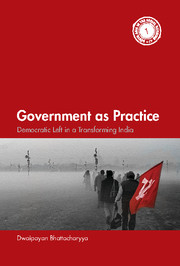Book contents
5 - Implosion: Singur, Nandigram
Published online by Cambridge University Press: 05 March 2016
Summary
On a sultry August day in 2005, Buddhadeb Bhattacharjee left for Jakarta with a 22 member trade team to sign a Memorandum of Understanding (MoU) with Indonesia's biggest industrial house, the Salim Group of Companies. This was certainly not the first foreign trip by a Marxist chief minister to invite foreign direct investments, Jyoti Basu – West Bengal's previous and the country's longest serving chief minister – made several such trips to Europe and the US. This was, however, Buddhadeb's first major trip outside the country, and the investment proposed – to the tune of 50,000 crores – was extraordinarily high for the state's dwindling economy. A debate triggered off within the left over whether the government should invite a foreign multinational, if the Salim group – which allegedly had an anti-communist past – should be allowed to invest in the state. On both counts, Buddhadeb got the state committee and the politburo of the CPI(M) to come round his way. At a press conference on the eve of his departure the chief minister said that there was no other alternative, but the government was committed to protect the interests of the state's workers and the peasants. Three days later, on 25 August, the West Bengal Industrial Development Corporation (WBIDC) signed a MoU with the Salim Group to promote an industrial park in the form of a special economic zone (SEZ) in West Bengal. The final agreement was to be inked later, after the company submitted a detailed project report to the government.
This marked the beginning of a long saga in West Bengal's present politics. The left government was copiously doing what an investment-friendly state government does in India's competitive federalism. Major states try to outbid each other to woo private investment for setting up industries and infrastructure as state funding for such projects – which was the case in the pre-liberalized dirigiste economy – got dried up. However, a left state government had to answer a few difficult questions: Should it invite multilateral capital of foreign origin, which had been a target of its ideological opposition for decades? Should it accept proposals for SEZ, whose internal workings – including discriminatory labour law and questionable land-use – had already invited several criticisms from the left parties?
- Type
- Chapter
- Information
- Government as PracticeDemocratic Left in a Transforming India, pp. 155 - 212Publisher: Cambridge University PressPrint publication year: 2016



